Rocket Languages Review - Is it Worth the Cost?
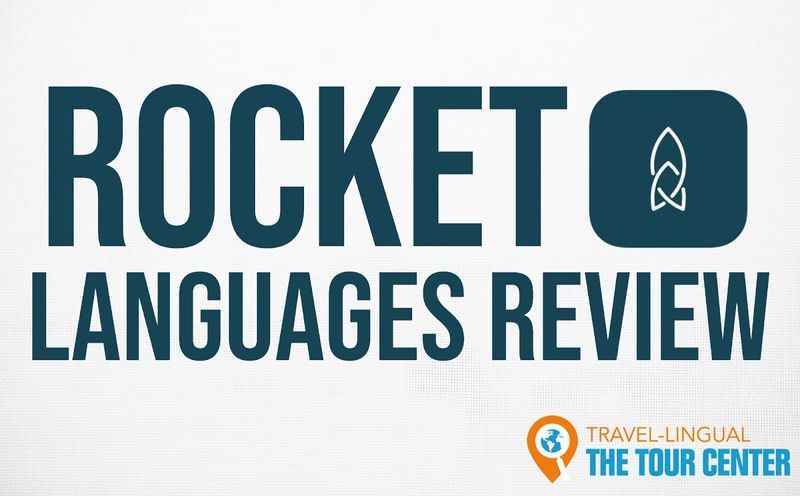
In this Rocket Languages review, I provide a comprehensive overview of Rocket Spanish, its course features and whether I think it's worth the cost.
Given that the Rocket Language course structure is the same for most languages, this review is still relevant to you even if you are not planning to learn Spanish.
The aim of this review is to help you decide whether or not Rocket Languages is the right online language resource for you. Read on to find out the best and worst features of Rocket Language courses.
This Rocket Languages review takes into account all of the new features being introduced by Rocket Languages for 2024 and beyond.
I discuss my experience using Rocket Spanish, its course structure and lesson features, pricing and how Rocket Languages compares to other language apps on the market.
What is Rocket Languages?
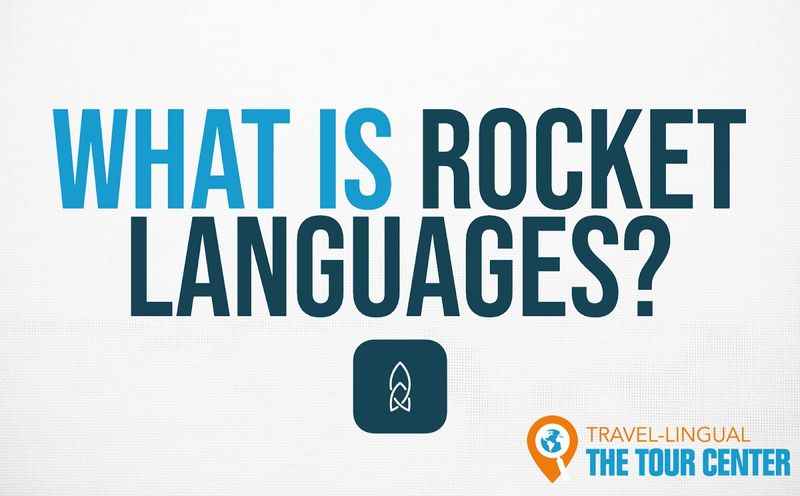
Rocket Languages is a software focused language learning app that uses audio lessons, interactive exercises and readings to get you to a conversational level in a foreign language.
The idea is that, through its structured and proven successful process, you will begin to understand more about the language you are learning.
As of 2024, Rocket Languages offers 13 languages for English speakers (including Castilian and Latin American Spanish) as well as three programs for English learners.
The platform and its courses are now used by over 1.2 million people. That’s a lot of language learners!
So, it must be doing something right…
Languages Available with Rocket Languages
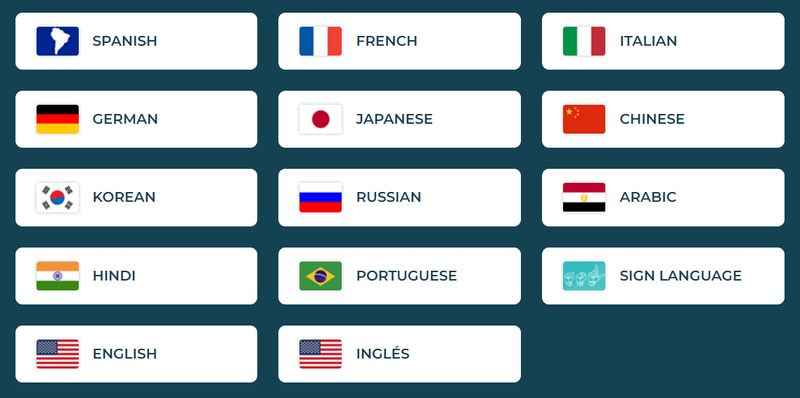
Rocket Languages currently offers lifetime access to the following online language courses:
- Rocket Spanish
- Rocket Portuguese
- Rocket Italian
- Rocket German
- Rocket French
- Rocket Russian
- Rocket Sign Language (American)
- Rocket English (for Spanish speakers)
- Rocket Japanese
- Rocket Korean
- Rocket Arabic (Egyptian)
- Rocket Hindi
- Rocket Chinese (Mandarin).
This is an impressive selection, covering Asian languages not currently available with its main competitor, Babbel.
Rocket Spanish continues to be the most popular course at Rocket Languages by some distance, followed closely by Rocket French and Rocket Japanese.
Rocket Languages Cost
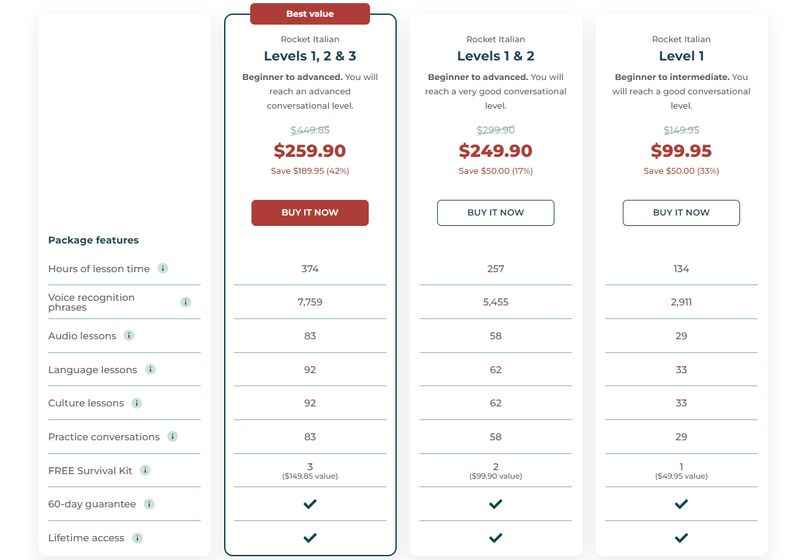
Access to any of these language courses incurs the same cost, starting at around $150.
This may seem pretty expensive, and I’m by no means saying it’s cheap. However, I do believe the cost is justified for a number of reasons.
Firstly, this option is proven to take learners from beginner to advanced through the following: .
- 370 hours of lesson time
- 10004 phrases with voice recognition
- 98 Interactive Audio lessons
- 87 Language & Culture lessons
- BONUS Survival Kits worth $149.85
This is a lot more content than is offered by many rival companies.
In addition to this, it’s not just the amount of content included in Rocket Language courses that make them good value. It’s the course structure and the actual lesson content included.
I’ll go through this now.
Rocket Languages Course Structure
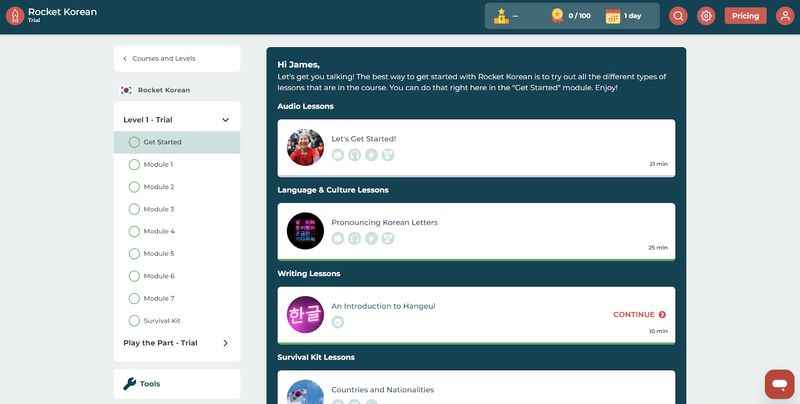
Each language available to learn through Rocket Languages offers a similar course structure. Rocket Spanish contains 3 levels, each of which contains 5-7 modules.
Each module contains a healthy and balanced mix of the following lesson types:
- Interactive Audio Lessons - Language & Culture Lessons - Survival Kit Lessons
Between Levels 1 - 3, Rocket Spanish contains more than 200 lessons.
Even with the amount of content included in Rocket Spanish, I don’t believe this alone is enough to take you from complete beginner to complete fluency.
However, by taking all 3 levels you’ll certainly gain a solid foundation in Spanish and get to a level where you can converse comfortably with native speakers.
Let’s take a look at what each of these lesson types actually looks like and whether the approach is right for you.
Interactive Audio Lessons
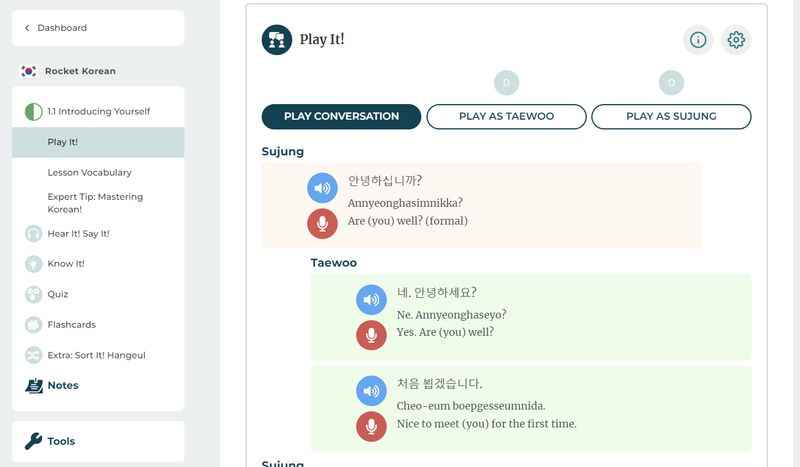
Rocket Languages’ interactive audio lessons are a key part of its language courses. Each of its 3 levels contains approx 30 audio lessons. In total, this amounts to more than 60 hours of learning time.
Each Rocket Spanish audio lesson lasts up to 40 minutes. Whilst this may seem long, it is broken down into a well thought through process which includes:
- Time to listen to a native speaker reading a text on a certain topic (more on this in the lesson content section) - A translation of the content - Time to respond to, and repeat, what you’ve heard
Whilst the audio lessons are, well, aural, there are a number of features within each lesson that will appeal particularly to visual learners. As a result, Rocket Languages caters for both aural and visual language learners.
Under each audio clip is a section containing a breakdown of the vocabulary and grammar relating to each content block or topic. This includes flashcards, games and language quizzes.
A Successful, Proven Method
There is a reason the audio lessons on Rocket Languages are core to their language courses.
In fact, the audio lessons are similar to those of rival company Pimsleur, which practices the SRS Method (Spaced Repetition System).
This concludes that the more you hear a word or phrase through spaced intervals, the more likely you are to remember it.
Any Pimsleur vs Rocket Languages review will show that the audio lessons are pretty similar, and highly effective. By contrast, Rocket Languages also boasts a separate content section (more on this shortly).
The aim of each audio lesson in Rocket Spanish is to fully immerse you in the language through increased exposure, albeit not strictly through the SRS Method.
That said, the flashcards below the audio section do serve this purpose, accompanied by language games and quizzes.
Furthermore, each lesson provides an opportunity for you to speak, even though the main aim is to listen.
Lessons also provide comprehensive explanations of the grammatical aspects of the Spanish language (or whichever Rocket Language course you take).
Don't be Put Off By Grammar
If grammar isn’t your thing, don’t let this put you off. The explanations are carried out in a way that makes basic Spanish grammar understandable.
It’s a similar approach to that of Coffee Break Spanish podcast,.which also discusses grammar throughout its lessons.
The Rocket Spanish audio lessons contain two speakers. One of these is a native Spanish speaker, the other a native English speaker.
As a learner, you find yourself third wheeling at times, listening to more of a discussion than a lesson!
The format of the Rocket Spanish audio lessons is good. However, there is one thing in particular that could be improved.
At times, the lessons seem very scripted, unlike similar Spanish learning resources such as Coffee Break Spanish.
I presume this is the case not only for Rocket Spanish but also for other Rocket languages.
Language & Culture Lessons
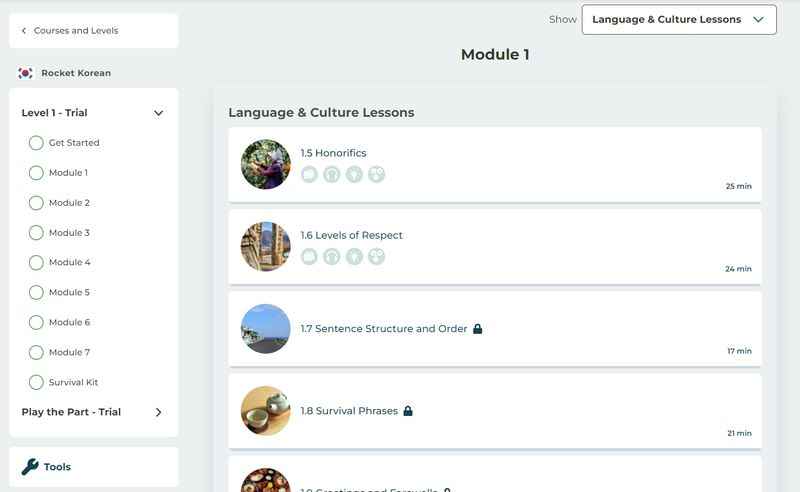
Each level (between 1 - 3) contains 60 hours of Language and Culture lessons. In addition, there are 60 hours of audio lessons.
Rocket Languages really does provide a lot of content with some of the most comprehensive courses I have trialed, especially when compared to other Spanish language resources.
There is a much greater emphasis on grammar within the culture lessons than there is within the audio lessons. Despite this, the audio lessons do touch on grammar and sentence structure frequently.
There are two main differences between the audio lessons and the language and culture lessons.
Firstly, perhaps as you might expect, you get a much deeper understanding of the people that speak the language within Rocket Languages’ culture lessons, as well as their countries, customs and traditions.
Secondly, the language and culture lessons do not contain any audio. Instead, they are solely text orientated, much like a Spanish textbook.
In my opinion, this is both positive and negative. I do like the fact that Rocket Spanish provides an opportunity to better your Spanish reading and writing skills, (in addition to the listening and speaking exercises in the audio lessons). However, arguably, text heavy content puts visual learners at a disadvantage.
If you are a visual learner (you learn languages best through visual tools) then for this reason you may not be a fan of the language and culture lessons.
I believe it is clear to see that Rocket Languages is trying to benefit language learners of all types by mixing its teaching methods in this way.
Writing Skills Lessons
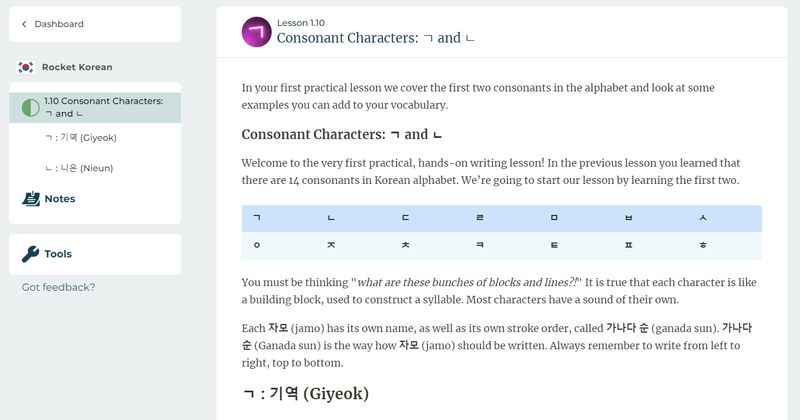
This information is not relevant for anybody thinking of taking Rocket Spanish. However, it will be useful for anybody thinking of learning a language with a different writing system.
For languages within this bracket (such as Arabic, Chinese or Hindi, Rocket Languages dedicates part of its online language courses to writing.
The course provides videos which prompt you to watch and copy the writing styles. Whilst this isn’t my preferred way to learn languages, I do feel Rocket Languages is limited here with its ways to teach writing styles.
In honesty, there is not much content in this section that you couldn’t just find online for free.
Survival Kit Lessons
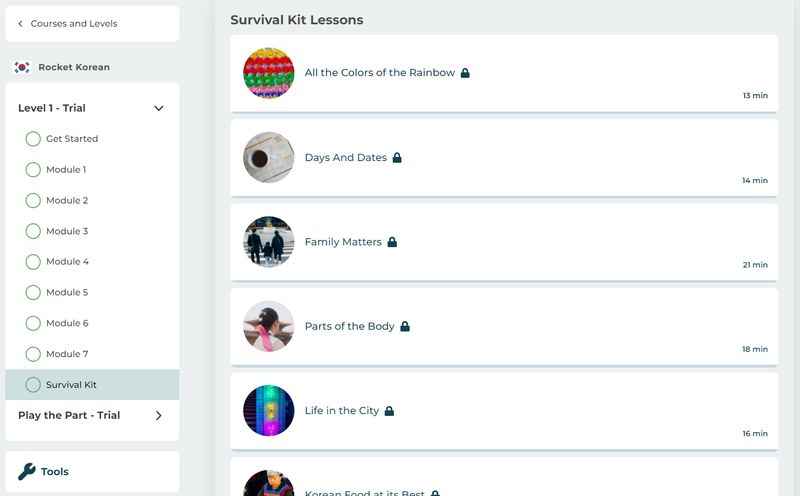
Rocket Spanish, Rocket French, Rocket German etc also contain Survival Kit lessons. This particular part of the course reminds me of my time using Memrise Japanese.
It brings together a lot of useful vocabulary related to specific topics and daily scenarios. This includes eating out, commuting to work, going shopping etc.
The survival kit lessons in Rocket Spanish are useful. However, in my opinion, they are not as valuable as the audio and language & culture lessons.
You’ll find a lot more value in the audio and language lessons than in any other part of the course.
Rocket Languages Lesson Content
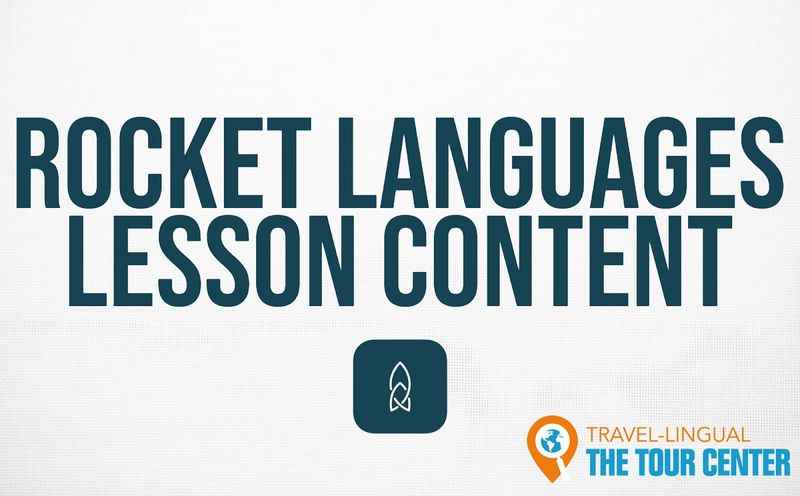
There are a few points I want to cover here, not just for Rocket Spanish but for all Rocket Language courses.
1. You Can Take Your Study Offline
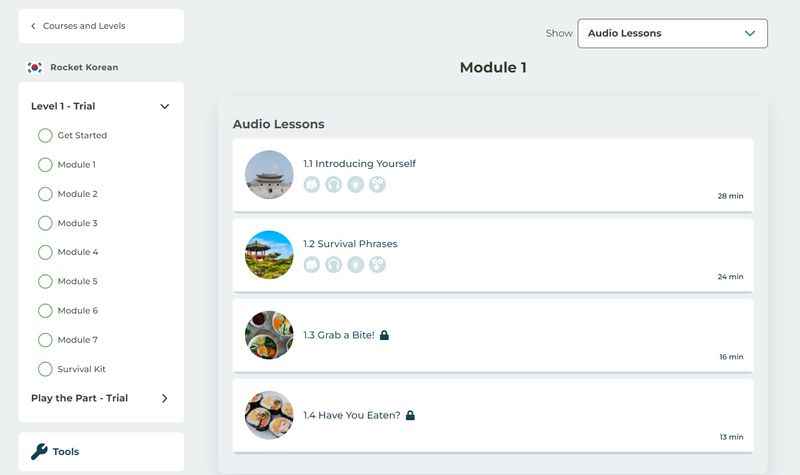
The great thing about Rocket Languages is that you are not restricted to learning a language online or on its platform.
All of the audio content is downloadable as MP3 so you can study Spanish away from the platform, whilst driving to work etc.
Whilst you can do this with Pimsleur, this is not something you can do with the likes of Duolingo, Babbel, Memrise etc.
So, it puts Rocket Languages ahead in this aspect.
2. Advanced Levels Are Pretty Unique
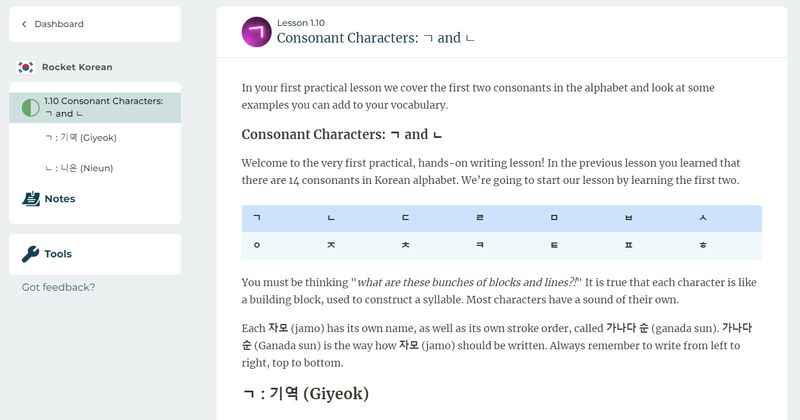
Rocket Languages has invested heavily in its advanced levels. As a result, the experience for language learners does not decline the further they progress.
This makes it better for intermediate and advanced learners than competitors such as Babbel, for example.
With Babbel, most of the best content resides in beginners courses, with little content for intermediate and advanced learners.
In addition to this, the Rocket Spanish advanced content builds upon what has been covered already, containing a number of interesting cultural topics and talking points.
3. The Travelogues Contain Some of the Best Language Content

Note these are separate - Rocket Languages also boasts Travelogues for Rocket Spanish, French, Russian and Italian.
Unlike the survival kits, the travelogues offer excellent content which not only recaps what you’ve learned so far, but also delves deep into Latin America with two natives who explore the region and the various cultural elements within it.
The Rocket Spanish Travelogues are (sort of) standalone courses, not included with the main Level packages. However, they are much cheaper to purchase when as an add on, not on their own.
The travelogues contain situational dialogues, audio tracks, Spanish to English toggling, Reinforcement Testing, Flashcards, Progress tracking and a lot more.
If you are learning Spanish for travel specifically rather than just for fun then I do recommend giving the travelogues a go; they’re one of the best things about Rocket Spanish.
The Desktop Experience
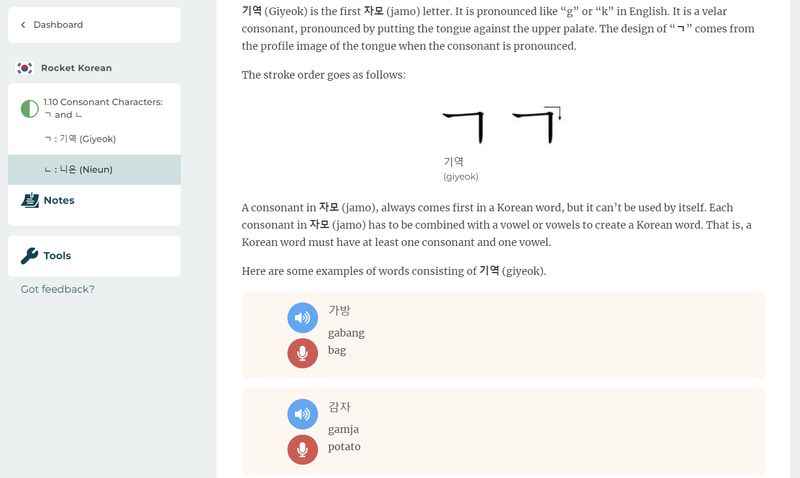
I mentioned the quality of Rocket App earlier, but Rocket Languages has also improved its desktop experience for its users.
The new experience is bright and visually appealing with an interface that is much easier to navigate than before.
Rocket Languages has definitely caught up with Duolingo and Babbel in this aspect, who were miles ahead before with their language course layouts and overall user experience.
The Rocket desktop now has a fresh interface which splits content and other features into separate columns, making navigation much easier.
Rocket Languages App
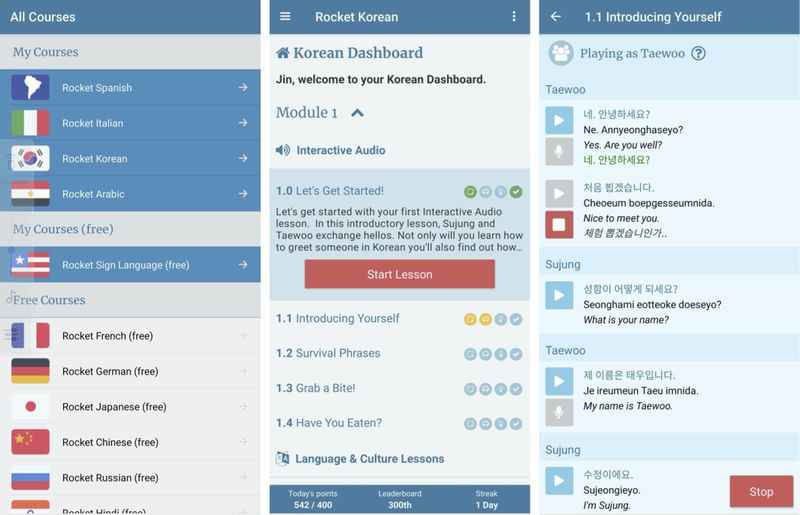
As mentioned, you can take your study offline with Rocket Languages by downloading the audio content.
It’s clear to see that Rocket Languages have invested heavily in the app, which also provides a way to learn on the go and practice whenever/wherever you like.
Rocket Languages is not unique in having an app to help you study away from a desktop. However, it does at least provide another reason to consider learning a language with them.
The Rocket app is available for Android as well as iOS.
Rocket Languages Pricing & Refunds
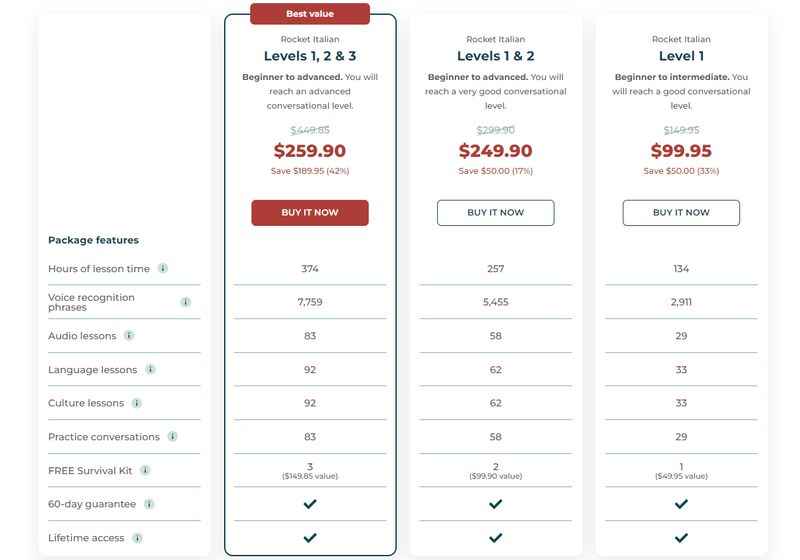
Each language has 3 levels, which you can purchase individually, or as a bundle.
In all cases, you pay a one-time fee in order to receive lifetime access. This is different to most language software companies that charge less but on a recurring monthly basis.
The pricing varies throughout the year but on average it is set out as follows:
Level 1 - $149.95 Level 1 & 2 - $299.90 Levels 1, 2 & 3 - $449.85
Rocket Languages offers everybody a free trial, which isn’t limited by time, but rather by content. In addition, you’ll have access to 4 Rocket Spanish (or French, German etc) lessons. However, all the other content is blocked.
As with any online language resource, I recommend taking advantage of a free trial before committing to any purchase.
Importantly, Rocket Languages guarantees to refund anybody who is not impressed with its service within 60 days of purchase.
Additional Rocket Languages Features
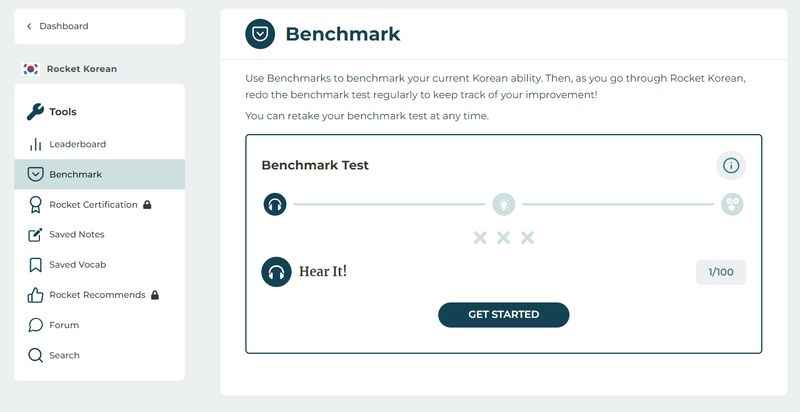
There are a number of additional features that anyone learning a language with Rocket Languages will have access to. These include, but are not limited to:
Testing & Reinforcement
As mentioned earlier, Rocket Languages incorporates a number of SRS Method techniques to increase the speed at which you can learn a language. After all, they do guarantee you’ll be intermediate by Level 2 and advanced by Level 3.
These methods include:
- Flashcards
- Vocabulary practice
- Quizzes
- Multiple choice questions (to test how well you have understood audio lessons).
- Write it, Sort it & Draw it (the activities are there to help you develop your reading and writing skills after lessons.
- Voice Recognition- this is a relatively new feature and one which Rocket Languages was previously lacking.
Similarly to its competitors Duolingo and Babbel, Rocket Languages now uses a Google Web Speech API which is able to track and recognise your pronunciation before comparing it with the native speakers in the Rocket course.
You’re given a score out of 100, based on how good your pronunciation is.
Whilst this feature is definitely an improvement on previous Rocket versions, I don’t believe it’s anywhere near as beneficial as practicing your pronunciation with an online language tutor.
- Language Learning Support - if you purchase a Rocket Language course then you’ll have access to fellow language learners, teachers and native speakers.
Furthermore, you’ll be able to ask and answer questions in a language forum style format.
This is definitely a great feature, and a good way to meet other language learners.
Final Thoughts - Review Summary
Rocket Languages is one of the more expensive online language learning resources short term because it requires a one-time payment.
Its lesson features, comprehensive courses and travelogues make it better than the majority of its competitors for beginners, intermediate and advanced learners.
This means that a one-time payment can, indeed, take you from complete beginner to advanced level with the right commitment and study time.
However, in my opinion, Rocket Languages alone will not make you fluent in any language. That said, it will definitely give you a strong, comprehensive understanding of it.
In any case, you will need to compliment any work with human interaction and, if possible, face to face contact.
When learning any language, it’s best to find a tutor. You can find one on italki, where lessons start from $4 p/hour.
I am currently learning Japanese on italki, and I mix my software related study with 1 hour of online class per week.
Not only does finding a tutor increase your confidence when it comes to speaking, but it also reminds you why we learn foreign languages.
To interact with new people, broaden our perspectives and explore new cultures.







